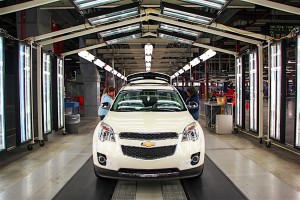
The shift towards electric delivery vans picked up more momentum with the announcement by General Motors that it plans to build EV vans at the CAMI assembly plant in Ingersoll, Ontario.
The company plans to spend big money to bring production of its electric light commercial vehicle, the EV600 or Bright Drop delivery van to Canada. A spokeswoman for GM of Canada said the investment of CA$1 billion Canadian dollars, approximately $787 million, is subject to several conditions, including ratification of a tentative 2021 agreement reached with Unifor and confirmation of government support.
GM announced during its presentation for this year’s virtual Consumer Electronics Show, or CES, that it planned to launch a new business dubbed “BrightDrop” based on its Ultium electric vehicle platform, which also is slated to carry vehicles such as the GMC Hummer, Cadillac Lyriq and possibly an electric Corvette.
(GM wants to revolutionize e-commerce with electric droids and vans.)
The objective for BrightDrop, as outlined by GM executives, will offer an ecosystem of electric first-to-last-mile products, software and services to empower delivery and logistics companies to move goods more efficiently with lower costs, higher productivity and greater employee safety and freight security. sustainable way.

Currently the CAMI plant builds the Chevrolet Equinox, which is the company’s top-selling sport-utility vehicle and second-best selling vehicle overall trailing only the Chevrolet Silverado full-size pickup.
Most of the focus on where GM would build EVs has focused on its new Factory Zero, which is a $2.2 billion refurbishment of its Detroit-Hamtramck Assembly Center. The site is already slated to build its GMC Hummer – the truck as well as the SUV to come later, plus the Cruise Origin. It was supposedly going to build the Nikola Badger electric pickup as well before that deal fell through. However, the company isn’t limiting its EV production to the one site.
The recently introduced Cadillac Lyriq will be produced at the former Saturn plant in Spring Hill, Tennessee. Additionally, it currently builds the Chevrolet Bolt, its only existing electric vehicle at the Orion Assembly site, about an hour north of Detroit. That plant used to build five different vehicles but currently just produces the Bolt. Future EVs, like the Bolt EUV, Chevrolet Silverado electric pickup and the just revealed Cadillac Celestiq and many more haven’t been designated to any production sites yet.
(GM rolls out new logo and marketing campaign pitching its corporate transformation.)
The investment in Ingersoll also appears to head off a potential clash with Unifor. Union members in Ingersoll struck for 30 days in 2017 to stop more of their work being shipped to Mexico and the new investment appears to head off another clash about the plant’s future. The current labor agreement at CAMI, which originally began as joint venture between GM and Suzuki, is set to expire in September.

The move also will support GM’s timing to deliver BrightDrop EV600 in late 2021, enabling GM to make CAMI into Canada’s first large-scale auto plant converted to produce electric delivery vehicles, GM of Canada, officials said.
The new CAMI investments follow other recent GM investments in Canada that followed GM and Unifor, the union representing Canadian Auto workers, concluding a new three-year labor contract last fall.
GM of Canada’s 2020 settlement with Unifor including roughly $1 billion in investment to re-open Oshawa Assembly to build pickup trucks and separate investment in St Catherine’s, Ontario, and around Oshawa. Oshawa, a massive facility just outside Toronto, had been slated to be converted to a testing facility and component production site before GM reversed course to build trucks there.
(GM offers peek at ultra-exclusive Cadillac Celestiq — and Jetsons-like flying car.)
GM of Canada also is continuing discussions with the Ontario and Canadian federal governments regarding its new investments and looks forward to working closely with Unifor following ratification of the tentative 2021 agreement.







